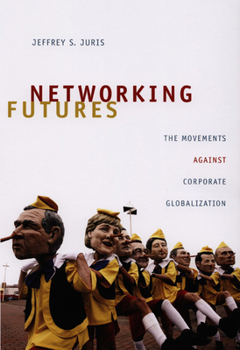Networking Futures: The Movements against Corporate Globalization
(Part of the Experimental Futures Series)
Select Format
Select Condition 
Book Overview
Since the first worldwide protests inspired by Peoples' Global Action (PGA)--including the mobilization against the November 1999 World Trade Organization meetings in Seattle--anti-corporate globalization activists have staged direct action protests against multilateral institutions in cities such as Prague, Barcelona, Genoa, and Cancun. Barcelona is a critical node, as Catalan activists have played key roles in the more radical PGA network and the...
Format:Paperback
Language:English
ISBN:0822342693
ISBN13:9780822342694
Release Date:July 2008
Publisher:Duke University Press
Length:400 Pages
Weight:0.30 lbs.
Dimensions:0.9" x 6.2" x 9.2"
Customer Reviews
2 ratings
Networks as technology, form, and norm
Published by Thriftbooks.com User , 13 years ago
Since the Internet revolutionized communication technology in the nineties, the concept of the network has become an organizational model to be emulated--a utopian vision even--across vastly different spheres of social life, not the least of which is political activism. The growing importance and prevalence of activist networks, however, has been reflected in only a limited way in the anthropological literature on social movements, and few scholars have approached networks as more than mere abstractions and metaphors at best or, at worst, as static structures. Networking Futures: The Movements Against Corporate Globalization by Jeffrey Juris, on the other hand, provides us with a very necessary and highly successful ethnographic study of the concrete mechanisms, practices, and social relations that constitute the activist networks characteristic of the anti-corporate globalization movements that began with the Zapatista uprising in 1994 and the anti-WTO protests in Seattle in 1999. Since those times, the organizational models and utopian imaginaries of activist networks have profoundly reshaped the social movement landscape across the globe--particularly in Western Europe, Latin America, and the United States--making Juris' well-theorized and richly descriptive study relevant for readers across scholarly disciplines and geographical boundaries. Juris describes activist networks as "locally rooted, but globally connected", and he attempts to make his own research similarly "multi-scalar". Thus, his research is rooted in long-term ethnographic fieldwork with the Movement for Global Resistance (MRG), a Barcelona based activist network, with which he actively participated in numerous meetings, discussions, events, and direct-action protests. While the most engaging chapters in Networking Futures may be the ones dedicated to how networks are "embodied" and made visible during protests, the work's larger aim and greater accomplishment is to study these networks during their "submerged" phases, illuminating how activist networks such as the MRG are not so much rigid organizations, but fluid processes animated as much by "transnational flows of people, ideas, strategies, and tactics" as by Catalan cultural and political landscape and history. The central argument of Networking Futures, which Juris repeats like a mantra throughout the book, is that "anti-corporate globalization movements involve a growing confluence among networks as computer-supported infrastructure (technology), networks as organizational structure (form), and networks as political model (norm), mediated by concrete activist practice" (p. 11). He is thus concerned with examining how new technologies, and particularly the Internet, not only provide the arena and means of organization for these movements, but also shape its logic and political goals, such that spreading network technologies, forms, and norms outward becomes a political goal itself. Like anarchists of old, these activists
A grounded study of a shifting object
Published by Thriftbooks.com User , 14 years ago
Juris gives us an excellent ethnographic study of networked social movements, without losing site of his subject. Many recent monographs that take as their object of interest "networks" or "social movements"-- shifting and somewhat ephemeral as they are-- jump around too much in their attempts to "follow the object." These examples tend to be overly theoretical and devoid of the best qualities of ethnography: human voices! Juris manages to follow his interlocutors around the globe to different anti-globalization protests, rallies, etc, while still giving ethnographic insight into who these people are, what their motivations are, and how they manage to organize their groups across geographic and digital space. Juris's "militant" positioning allows him to get inside information from radical anarchist groups while being critically reflexive. Juris's book struck me as an innovative approach to studying social movements. An important and interesting topic given the influence of various social movements and interest groups on politics today. I would really like to see it compared to a similar type of study on right-wing political movements.





